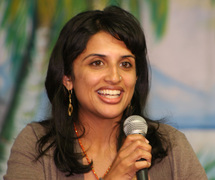Two worlds collide in Tania James's fiction
Myriam Chaplain-Riou
VINCENNES, Myriam Chaplain-Riou- When Tania James writes she travels, navigating between her parents' birthplace in India and the United States where the young author has spent most of her life, she told AFP.
"Atlas of Unknowns", her first novel, shuttles constantly between India and New York, as she explained in an interview at the "Fiction America" literary festival at Vincennes, just outside Paris.

Tania James
"India is always there, with me", she said, likely with Kerala in mind. But on the American side, "It's more a regional identity, rather than a national one. Kentucky, this is my home."
When the Harvard university graduate lived in New York, she always asked herself whether she felt like a New Yorker, but decided "definitely not".
"I'm not an American in a patriotic way. My parents are much more patriotic." Her father, the eldest in a family of seven children, is a doctor and nearly all her family has joined her in the United States.
Identity is about how people look at you, she explained. In India she is identified as an American woman: "I don't behave as Indian women, I don't speak like them."
In the United States she has also at times felt like an outsider: "In large cities, with a lot of communities, nobody cares. But when I was campaigning, in Virginia... knocking at doors, some old people had never seen someone like me!"
Her novel, which was published in 2009, follows two sisters, Linno and Anju, whose mother died -- perhaps committed suicide -- when they were both young.
The girls are Christians from Kerala without much money. But Anju is ambitious: she dreams of studying in New York, and in pursuit of her dream steals her sister's drawings to win a scholarship.
The American dream twists into a nightmare however, and in New York Anju is haunted by the memory of her mother, who also had fantasies about going to the United States.
"Anju is an ambivalent character," explains James, who took Visual and Environmental studies at Harvard. "She's selfish but she thinks that she knows what is the best for her family. She sees herself like a saviour."
James insists the novel is not preaching the moral message of the " 'bad girl' gets punished".
"What I liked, was the idea of the opposite trajectories. One stays in India, and is doing well. The other goes to the States and it's not what everyone is expecting."
James wanted to write "against the 'cliche' of immigration" and the American dream.
The young writer, whose own path reflects an immigration success story, is not convinced that if you have talent you will always succeed.
"It happens but it's not always true. Not at all."
--------------------------------------------------------------------------